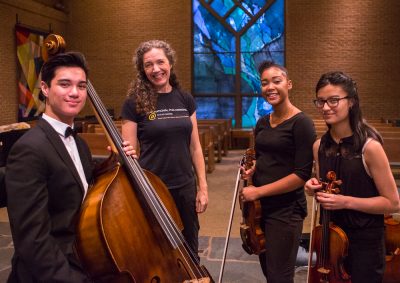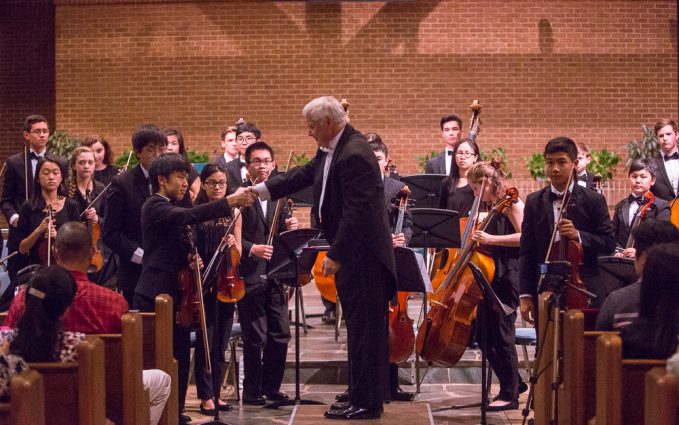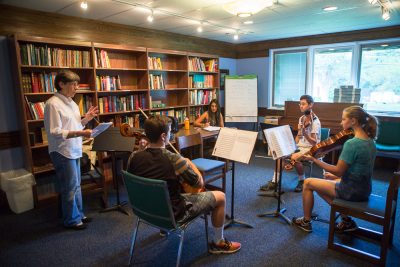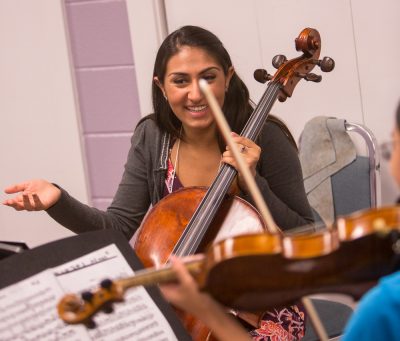String instruments–like violins and cellos–are challenging, but they are the heart of an orchestra. How do we guarantee the artistry string players need is transmitted to future generations?
Enter the National Philharmonic (NP), the ensemble-in-residence at the Music Center at Strathmore, which sponsors three Summer String Institutes. These “nurture the skills and talents of young musicians and encourage their participation in classical music now and throughout their lives,” said Piotr Gajewski, the orchestra’s music director and conductor.

The first component, the Senior String Institute, was launched in 1998 as a one-week training program for advanced high-school string players. “At the time, I was aware of numerous music camps that existed for students, but none, locally,” Gajewski said.
The first Institute technically predated the NP, which grew out of a merger of the National Chamber Orchestra and Masterworks Chorale in 2003. The Junior String Institute, for middle schoolers, followed. This year, for the first time, the Prep Institute, for rising fourth- to sixth-graders, was established.
The Senior Institute now encompasses two one-week sessions; students may attend one or both. The other two Institutes are one-week long.
The Senior and Junior Institutes are structured as 9 a.m. to 5 p.m., five-day-a-week day camps, while the Prep Institute runs 9:30 a.m. to 3:30 p.m., five days a week. All three offer an intensive program of orchestra rehearsals, chamber music rehearsals, coaching, and private lessons and movement classes–the latter to “help students feel the musical rhythm and tempo in their bodies,” said Judy Silverman, an NP violist and co-founder of the Summer String Institutes. The Institutes culminate in performances by the orchestra and chamber ensembles.
Despite their serious nature, the Institutes are not all business. “While the students work on ambitious musical repertoire to develop true professionalism, they also enjoy the camaraderie with their fellow students and the adventure of creating great music,” said Victoria Gau, the NP’s associate conductor.

Justin Park touts those benefits. A rising senior at Poolesville High School, he began playing violin eight years ago, in fourth grade. This is his fourth summer with the Senior String Institute.
“I had never participated in orchestra camp before, and wanted to give this one a try,” he said. “I’ve gained a lot of experience playing in a string orchestra and in smaller chamber groups.”
Admission to the Institutes is largely based on students’ ability to play the repertoire required and on teacher recommendations. “Students study and perform some of the most-challenging and tested chamber and orchestra repertoire for strings,” Gajewski said.
The National Philharmonic is excited about the inclusion elementary-school students. “With the Senior and Junior Institutes in place, there had been discussions during the past couple of years to add a level that could serve as an introduction, or bridge, to the older levels, so young musicians will be prepared for what is to come,” said Jennifer Van Petten, conductor of the Potomac Valley Youth Orchestra’s Sinfonia who also directs the Prep Institute.
In addition to teaching specific repertoire, the Institutes help develop musicianship, which, Van Patten explained, goes beyond the “fundamentals, intricacies and nuances of learning and simply playing an instrument to encompass artistic sensitivity. We hope that with the addition of the Prep Institute, our young musicians will have an additional outlet and opportunity–beyond those in the community–to strengthen their emerging artistry with their peers and the professionals from the National Philharmonic.”

The Institute schedules–filled with instruction and rehearsals—do not allow much opportunity for practice, so students are expected to prepare the assigned music ahead of time. “We mail the music to kids in advance, so they’re ready by the time they come to the Institutes,” said Silverman. “It’s very difficult music.”
The Institutes have never required formal in-person auditions for admission. But this year, for the first time, they asked for video auditions for high- and middle-school applicants. These auditions help the NP place students within the orchestra and chamber music groups rather than determine admission. “We don’t have a rank order,” Silverman explained. “We usually aim for between 45 and 50 students in the Senior Institute and fewer for the two younger groups, and can usually accommodate all who apply.”
Another aspect of the Institutes program are unpaid internships in which older students who have participated in an Institute help younger ones. Preetcharn Saund, one of those interns, attended the String Institute in 2010.” I really liked it, but then aged out when I graduated from high school,” she said. Seeking a way to continue with the program, she became an intern.
In the Junior Institute, interns play with the orchestra to fill out the strings, and coach the younger students. With the Senior Institute, they work with the chamber group and the faculty groups and assist in rehearsals.

In whatever capacity, said Saund, it’s “very nice to be able to work with and play with the students. It’s most gratifying to see how much they improve in a week. It’s the feeling you get when someone else is benefiting from your help. And it’s about giving back, because once I was in the exact same spot.”
The NP encourages the love of classical music in young people–musicians and not–through its “All Kids, All Free, All the Time” program. Youngsters, ages 7 to 17, attend all its concerts free. But the Summer String Institutes are a special source of pride.
“The program has grown and is highly regarded,” Gau said. “At first, only a handful of area teachers were sending their students. Now there are many more, some from as far away as Gettysburg and Baltimore.”
Participation has left a lasting impression on Park. “Being able to work with so many other great musicians, both students and professionals, is an amazing privilege,” he said. “But it’s also a fun experience I’ve made many new friends, some of whom I would likely never have met elsewhere.”
The Senior String Institute ran through Aug. 11, and the Junior program ran through Aug. 18 in Trinity Lutheran Church in North Bethesda. The Prep Institute, Aug. 21 to 25, will present an informal afternoon performance for students’ families on the afternoon of Aug. 25. Visit www.nationalphilharmonic.org/education/summer-string-institutes.aspx. Learn more about the National Philharmonic Orchestra and Chorale on CultureSpotMC here.